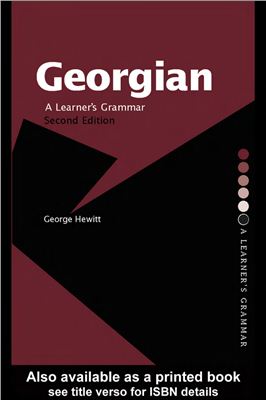Hewitt B.G. Georgian: a leaer’s grammar. - New York: Routledge,
2005. - 482p.
This is the second edition of Georgian: A Leaer’s Grammar, which was initially prepared as Georgia was emerging from seventy years of Soviet rule and taking its first tentative steps along the far from rosy path to independence. Much has changed in the meantime, such as the shift in currency from the rouble (in Georgian maneTi maneti) to the lari (in Georgian lari), rendering a review of the content of the various lessons essential. Such a review was made during the preparation of this edition.
The whole work has now been examined by two native Georgian speakers, Neli Chachibaia and Lia Abuladze, to both of whom I take this opportunity to express my deep appreciation for their efforts; and I do, of course, absolve them entirely from any remaining deficiencies. The inaccuracies that tued up over the years, as the book served as a basic text for the two Georgian courses (Elementary and Intermediate) offered at SOAS, or that were brought to my attention by communication from non-SOAS readers, have been corrected, and my thanks go to all who have contributed to this exercise in emendation. Of the two anonymous Georgian speakers who were asked by the publishers to assess the final manuscript, one in particular provided a number of comments, which led to a reassessment of some points, some additional explanatory observations and, with the approval of Neli Chachibaia, some further alterations.
This is the second edition of Georgian: A Leaer’s Grammar, which was initially prepared as Georgia was emerging from seventy years of Soviet rule and taking its first tentative steps along the far from rosy path to independence. Much has changed in the meantime, such as the shift in currency from the rouble (in Georgian maneTi maneti) to the lari (in Georgian lari), rendering a review of the content of the various lessons essential. Such a review was made during the preparation of this edition.
The whole work has now been examined by two native Georgian speakers, Neli Chachibaia and Lia Abuladze, to both of whom I take this opportunity to express my deep appreciation for their efforts; and I do, of course, absolve them entirely from any remaining deficiencies. The inaccuracies that tued up over the years, as the book served as a basic text for the two Georgian courses (Elementary and Intermediate) offered at SOAS, or that were brought to my attention by communication from non-SOAS readers, have been corrected, and my thanks go to all who have contributed to this exercise in emendation. Of the two anonymous Georgian speakers who were asked by the publishers to assess the final manuscript, one in particular provided a number of comments, which led to a reassessment of some points, some additional explanatory observations and, with the approval of Neli Chachibaia, some further alterations.

